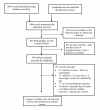Fear of hypoglycaemia in parents of young children with type 1 diabetes: a systematic review
- PMID: 20633252
- PMCID: PMC2912881
- DOI: 10.1186/1471-2431-10-50
Fear of hypoglycaemia in parents of young children with type 1 diabetes: a systematic review
Abstract
Background: Many children with type 1 diabetes have poor glycaemic control. Since the Diabetes Control and Complications Trial (DCCT) showed that tighter control reduces complication rates, there has been more emphasis on intensified insulin therapy. We know that patients and families are afraid of hypoglycaemia. We hypothesised that fear of hypoglycaemia might take precedence over concern about long-term complications, and that behaviour to avoid hypoglycaemia might be at the cost of poorer control, and aimed to evaluate the effectiveness of any interventions designed to prevent that. The objective of this review was to systematically review studies concerning the extent and consequences of fear of hypoglycaemia in parents of children under 12 years of age with type 1 diabetes, and interventions to reduce it.
Data sources: MEDLINE, EMBASE, PsycINFO, The Cochrane Library, Web of Science, meeting abstracts of EASD, ADA and Diabetes UK, Current Controlled Trials, ClinicalTrials.gov, UK CRN, scrutiny of bibliographies of retrieved papers and contact with experts in the field.Inclusions: Relevant studies of any design of parents of children under 12 years of age with Type 1 diabetes were included. The key outcomes were the extent and impact of fear, hypoglycaemia avoidance behaviour in parents due to parental fear of hypoglycaemia in their children, the effect on diabetes control, and the impact of interventions to reduce this fear and hypoglycaemia avoidance behaviour.
Results: Eight articles from six studies met the inclusion criteria. All were cross sectional studies and most were of good quality. Parental fear of hypoglycaemia, anxiety and depression were reported to be common. There was a paucity of evidence on behaviour to avoid hypoglycaemia, but there were some suggestions that higher than desirable blood glucose levels might be permitted in order to avoid hypoglycaemia. No studies reporting interventions to reduce parental fear of hypoglycaemia were found.
Conclusions: The evidence base was limited. Parents of children with Type 1 diabetes reported considerable parental fear of hypoglycaemia, affecting both parental health and quality of life. There is some suggestion that hypoglycaemia avoidance behaviours by parents might adversely affect glycaemic control. Trials of interventions to reduce parental anxiety and hypoglycaemia avoidance behaviour are needed. We suggest that there should be a trial of structured education for parents of young children with Type 1 diabetes.
References
-
- Williams G, Pickup JC. Handbook of Diabetes. Oxford: Blackwell Sciences; 2000.
-
- Wright A. Metabolic memory in type 1 diabetes. British Journal of Diabetes & Vascular Disease. 2009;9:254–257.
-
- Diabetes Control and Complications Trial Research Group. Effect of intensive diabetes treatment on the development and progression of long-term complications in adolescents with insulin-dependent diabetes mellitus: Diabetes Control and Complications Trial. J Pediatr. 1994;125:177–188. doi: 10.1016/S0022-3476(94)70190-3. - DOI - PubMed
Publication types
MeSH terms
Substances
LinkOut - more resources
Full Text Sources
Medical
Research Materials
Miscellaneous


